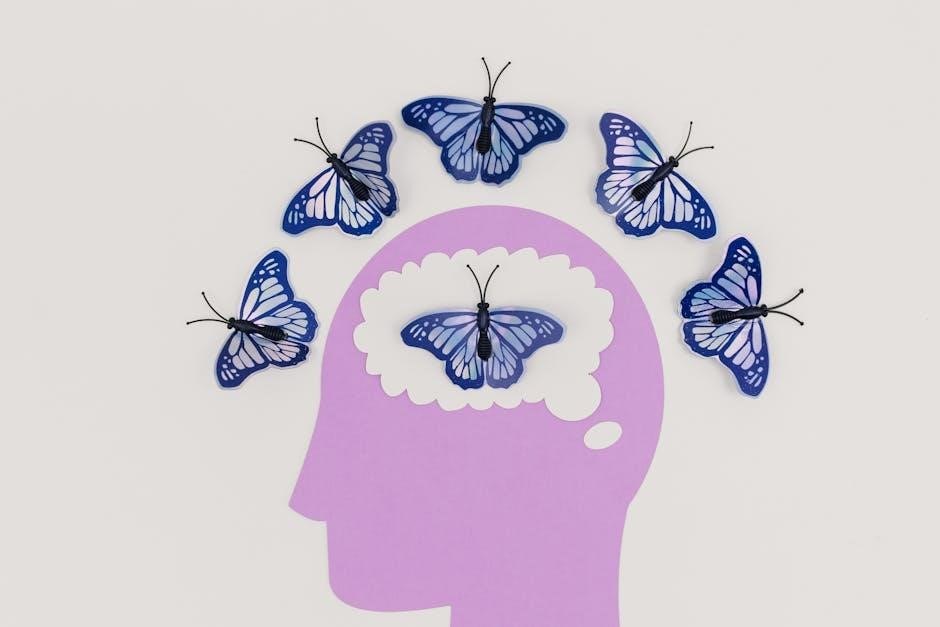
AP Psychology Exam 2019: Multiple Choice Overview
The multiple-choice section of the AP Psychology exam assesses your understanding of core psychological principles, theories, and research․ It requires applying knowledge to specific scenarios․ Expect questions that test your ability to analyze behaviors and situations using psychological frameworks․
Accessing the Official 2019 AP Psychology Exam PDF
Obtain the complete AP Psychology 2019 exam PDF package, including the multiple-choice section, free-response questions, and answer keys․ This resource provides valuable insights into the exam’s structure and content for effective preparation and review․
Availability of the Full Exam Package
The complete AP Psychology 2019 exam package, encompassing both the multiple-choice and free-response sections, is available in PDF format․ This comprehensive resource offers students a realistic preview of the exam’s content, structure, and difficulty level․ Accessing the full exam package allows for thorough practice and familiarization with the types of questions encountered on the actual AP Psychology exam․ Students can utilize this resource to identify their strengths and weaknesses, enabling them to focus their study efforts on areas requiring improvement․ The answer key included in the package facilitates self-assessment and provides valuable feedback on performance․ The availability of the full exam package serves as a crucial tool for effective exam preparation․
Structure of the AP Psychology Exam
The AP Psychology exam consists of two sections: multiple choice and free response․ The multiple-choice section accounts for two-thirds of the exam grade, testing knowledge of psychological concepts, theories, and research methods․
Multiple Choice Section Details
The multiple-choice section comprises seventy-five questions to be completed in ninety minutes, contributing to 66․7% of your final AP Psychology exam score․ These questions are designed to evaluate your comprehension of various psychological concepts, theories, and research methodologies․ Success in this section hinges on your ability to define key terms, recall significant facts, and apply theoretical frameworks to real-world scenarios․ Therefore, thorough preparation, including consistent review and practice, is crucial for achieving a high score․ Familiarizing yourself with the format and content will significantly boost your confidence and performance․

Types of Multiple Choice Questions
AP Psychology multiple-choice questions assess your grasp of concepts, recall of facts, and application of theories․ Expect questions requiring you to define terms, remember key findings, and apply psychological principles․
Concept Application
Concept application questions on the AP Psychology exam require students to utilize their understanding of psychological theories and perspectives to analyze specific scenarios and behaviors․ These questions present hypothetical situations or case studies where students must apply their knowledge to determine the most appropriate psychological concept or explanation․ Success depends on a strong foundation in core psychological principles and the ability to transfer that knowledge to novel situations․ It tests not only recall but also the capacity for analytical and critical thinking within the context of psychology․
Recall of Facts
Recall of facts questions on the AP Psychology exam directly assess your ability to remember and accurately state specific information, definitions, and key details covered throughout the course․ These questions often focus on the identification of terms, historical figures, research findings, and the specifics of psychological concepts․ Success on these questions relies heavily on diligent memorization and a comprehensive understanding of the foundational knowledge within each unit of study․ Though seemingly straightforward, a strong grasp of these facts is crucial for building a deeper understanding of psychology․
Application of Theories
Questions focused on the application of theories require you to go beyond simple memorization and demonstrate a deeper comprehension of psychological concepts․ You will be presented with scenarios or case studies and asked to analyze them through the lens of specific psychological theories․ This involves identifying the relevant theory, understanding its core principles, and applying those principles to explain or predict behavior within the given context․ These questions assess your ability to connect abstract theoretical frameworks to real-world situations and to critically evaluate different perspectives on human behavior․ It also allows you to demonstrate analytical skills․

Utilizing Past AP Psychology Exams for Practice
Past AP Psychology exams are valuable resources for practice․ They provide insight into question format and content․ Although the exam has been updated since 2019, older exams can still aid in preparation․
Relevance of Older Exams (Pre-2024)
While the AP Psychology exam underwent revisions in 2024, older exams, particularly the multiple-choice sections, maintain relevance for test preparation․ Although questions and scoring might not perfectly align with the current format, they offer valuable practice․ These exams expose students to a broad range of psychological concepts, theories, and research methods․ Utilizing older exams builds familiarity with question styles and strengthens content knowledge․ They provide opportunities to identify areas needing further study․ Remember to supplement this practice with materials reflecting the updated exam format to ensure comprehensive preparation․

Scoring the Multiple Choice Section
The multiple-choice section contributes significantly to your overall AP Psychology score․ Each correct answer earns one point, with no penalty for incorrect answers․ Aim for a high score on this section․
Estimating Your Score
To estimate your score on the multiple-choice section, calculate the number of questions you answered correctly․ Since there’s no penalty for guessing, attempt all questions․ A raw score of 70 or above is generally considered excellent․ Use an AP score calculator for a rough estimate, but remember that FRQ performance also impacts your final score․ Strive to perform well on both sections for a higher overall grade․ Focus on understanding concepts deeply to maximize your success․ Consider past exam distributions for more accurate predictions․
Digital Format of the AP Psychology Exam
The AP Psychology exam transitioned to a digital format, administered through the Bluebook testing application․ Students complete both multiple-choice and free-response questions within the application․ All responses are automatically submitted at the end of the exam time․ The digital format includes features designed to mimic the paper-based experience while leveraging the benefits of technology․ Ensure familiarity with the Bluebook app before exam day to avoid technical difficulties․ The digital exam assesses the same course concepts and skills as the traditional format, outlined in the official AP Psychology Course and Exam Description․

Topics Covered in AP Psychology Multiple Choice Questions
AP Psychology multiple-choice questions span psychological theories, research methods, and human behavior․ Expect questions covering various subfields, including developmental, social, cognitive, and abnormal psychology․ A strong grasp of foundational concepts is essential for success․
Psychological Theories
The multiple-choice section frequently assesses your understanding of prominent psychological theories․ Expect questions about behavioral, cognitive, psychodynamic, and humanistic perspectives․ You will be tested on theorists like Freud, Skinner, Rogers, and Piaget․ Questions may require you to identify theoretical underpinnings of behaviors, compare and contrast theories, or apply them to novel situations․ A solid grasp of key concepts and their applications is vital․ Familiarize yourself with classical and contemporary theories to maximize your score on the exam․ Knowing the core principles of each theory ensures confident responses to a variety of question formats․
Research Methods
A significant portion of the multiple-choice questions will cover research methods․ Expect to encounter questions about experimental designs, correlational studies, and descriptive research․ You should be able to identify independent and dependent variables, control groups, and potential biases․ Understanding statistical concepts like p-values and standard deviation is crucial․ Questions may present research scenarios, requiring you to evaluate the validity and reliability of the findings․ Mastery of research ethics, including informed consent and debriefing, is also essential․ Familiarize yourself with various research techniques and their limitations to succeed in this section of the AP Psychology exam․
Human Behavior
The AP Psychology exam’s multiple-choice section thoroughly explores human behavior across various contexts․ Questions delve into topics like development, social psychology, personality, and abnormal psychology․ Expect scenarios requiring you to apply psychological principles to understand and explain human actions and interactions․ You should be familiar with concepts like attribution theory, conformity, obedience, and group dynamics․ Questions might assess your knowledge of psychological disorders, their symptoms, and treatments․ A strong grasp of developmental stages, cognitive processes, and the influence of culture on behavior is essential for success․ Be prepared to analyze complex situations and identify the underlying psychological factors driving human behavior․
Resources for AP Psychology Exam Preparation
Effective AP Psychology exam preparation involves utilizing varied resources․ Practice tests, review books, and online platforms are invaluable․ Understanding key concepts and theories is crucial for success on the multiple-choice section․
Quizlet for Vocabulary and Concepts
Quizlet offers a powerful platform for mastering the extensive vocabulary and key concepts in AP Psychology․ Flashcards, games, and study sets allow for interactive learning and memorization of terms like “Schizophrenia,” neurotransmitters, and research methodologies․ Understanding these terms is crucial for success on the multiple-choice section of the AP Psychology exam․ Quizlet provides a flexible and engaging way to reinforce your knowledge of psychological definitions, experiments, and theories․ Utilize Quizlet to solidify your understanding and improve your performance on the exam by actively engaging with the material․ Consistent review will boost your confidence․